As a child who grew up in the early 2000s, Rome Total War was one of the most exciting and immersive games I had ever played. The game's realistic battles and historical accuracy captivated me, and I spent hours upon hours playing through the game's lengthy campaign mode. The soundtrack, too, was a standout feature, with epic and immersive music that added to the game's overall atmosphere.
At the time of its release, Rome Total War was a groundbreaking game that set a new standard for historical strategy games. The attention to historical accuracy was a highlight, with a variety of authentic units and factions that reflected real-world history. The game's graphics, while not the most impressive for the time, were still impressive enough to immerse players in the game's world. The campaign mode was also a standout feature, offering a lengthy and complex gameplay experience that was a joy to play through.
That being said, there were some flaws with the game that became apparent over time. The AI system, in particular, was not as challenging or strategic as some players would have liked, which led to a lack of difficulty and replayability. The diplomacy system was also overly simplistic, which detracted from the game's strategic depth. However, these flaws did not detract from the overall enjoyment of the game, and it remained one of my favorite childhood games.
In conclusion, Rome Total War was a groundbreaking game for its time that set a new standard for historical strategy games. The attention to historical accuracy, immersive soundtrack, and lengthy campaign mode were standout features that made the game a joy to play. While the game had some flaws, such as its simplistic diplomacy system and lack of strategic depth in the AI, it remained a favorite among players and set the stage for future strategy games to come.
At the time of its release, Rome Total War was a groundbreaking game that set a new standard for historical strategy games. The attention to historical accuracy was a highlight, with a variety of authentic units and factions that reflected real-world history. The game's graphics, while not the most impressive for the time, were still impressive enough to immerse players in the game's world. The campaign mode was also a standout feature, offering a lengthy and complex gameplay experience that was a joy to play through.
That being said, there were some flaws with the game that became apparent over time. The AI system, in particular, was not as challenging or strategic as some players would have liked, which led to a lack of difficulty and replayability. The diplomacy system was also overly simplistic, which detracted from the game's strategic depth. However, these flaws did not detract from the overall enjoyment of the game, and it remained one of my favorite childhood games.
In conclusion, Rome Total War was a groundbreaking game for its time that set a new standard for historical strategy games. The attention to historical accuracy, immersive soundtrack, and lengthy campaign mode were standout features that made the game a joy to play. While the game had some flaws, such as its simplistic diplomacy system and lack of strategic depth in the AI, it remained a favorite among players and set the stage for future strategy games to come.
